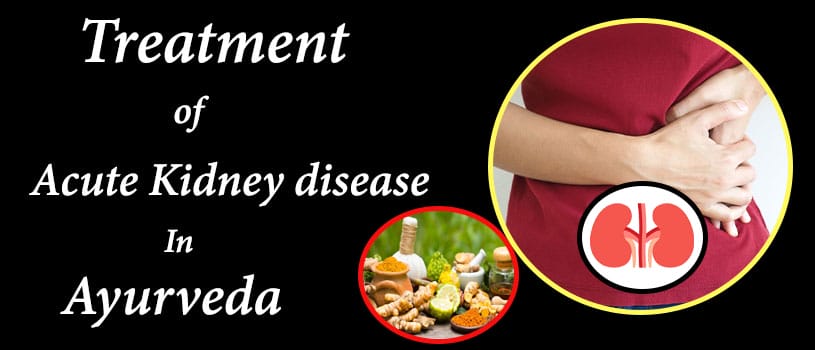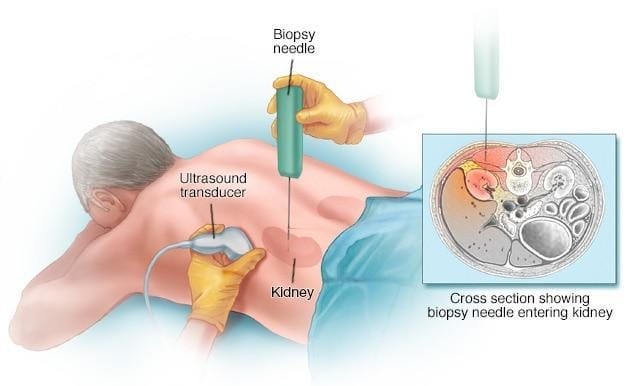Acute Kidney Failure
The acute kidney disease, like the rest of the human anatomy, plays an important role in health. Acute Renal Disease is a condition in which the kidneys experience spontaneous kidney malfunction. The state can be blamed on a variety of factors, but Ayurvedic Acute Kidney Disease Treatment provides treatment for all of them. Even though the loss can be estimated by elevated levels of various blood wastes such as Creatinine, nitrogen, and urea, an unanticipated loss might cause a variety of issues that require immediate attention. Acute Kidney Disease consequences include metabolic acidosis, fluid imbalance, uremia, excessive potassium, life danger, and others.
Acute kidney disease increases the chance of chronic kidney disease, which can damage many other body organs. Acute Kidney Disease can be handled by addressing the underlying cause of the disease or by providing supportive treatment, such as renal replacement therapy. Acute Kidney Treatment in Ayurveda focuses on treating the disease’s fundamental cause.

Acute Kidney Disease Causes:
It is investigating the causes of this abrupt intervention of injuries, which might be prompted by unsuitable actions or influenced by substance addiction and trauma. It has adequate potency to cause CKD (Chronic Kidney Disease). Acute Kidney Disease is caused by a few different systemic disorders, such as lupus nephritis and autoimmune diseases.
The following are the most common causes that lead to Acute Kidney Disease:
- Pre-renal: Pre-renal causes of Acute Kidney Disease include factors that contribute to a low Glomerular Filtration Rate (GFR). Both kidneys must be afflicted with this medical disorder.
- Intrinsic: Damage to the functional units of the kidneys is one of the most common causes of Acute Kidney Disease. Tumor lysis syndrome and rhabdomyolysis are two notable examples that fall under this group.
- Post-renal: Under the therapy of Acute Kidney Disease, post-renal causes are those that cause the kidneys’ function to deteriorate. Obstructions in the urinary tract are frequently the cause of this illness.
Acute Kidney Treatment in Ayurveda often describes the vulnerability differently depending on the symptoms of individuals. Both asymptomatic and symptomatic acute renal disease exist. Symptoms are replicated differently in different kidney habitats. These changes might be seen in the body to assess the symptoms.

The following Acute Kidney Disease symptoms are caused by the accumulation of chemical wastes in the bloodstream:
The presence of too much potassium in the blood can result in the following symptoms in the body:
- Heartbeats that are irregular
- Heart pounding
- Sweating excessively
Acute Kidney Disease is frequently caused by a lack of water. This is because when the body is dehydrated, the throat becomes dry, and the afflicted experience excessive thirst.
Other signs that the body of the afflicted may suggest are:
- Groin discomfort
- Skin that is dry
- Rashes
- Pain in the abdomen
- Pain in the flanks
Acute kidney disease symptoms include:
- Abnormal urine
- swelling in your legs, ankles, or feet
- You’re exhausted
- Breathing problems
- Feeling perplexed
- Nausea
- Chest discomfort or pressure
- Fatigue
- Shifts in mood
- Appetite loss.
- Vomiting
- Hypertension (high blood pressure)
- You have a metallic taste on your tongue.
The fluid build-up is one of the most common complications of acute kidney disease. The kidneys become damaged when they are unable to eliminate fluid and waste from the body. It’s a serious consequence in any renal condition since it causes fluid retention.
- Chest discomfort – Chest pain can be caused by a build-up of fluid in the lungs.
- Muscle wasting – Muscle weakness can occur when the body’s fluid, electrolytes, and blood chemistry are out of balance.
- Kidney injury that is permanent – Acute Kidney Failure might result in irreversible kidney damage and end-stage renal disease.
- Death – Because Acute Kidney Disease strikes unexpectedly, it can lead to a loss of kidney function and, indeed, death.

Ayurvedic treatment for Acute Kidney Disease:
People nowadays prefer Ayurvedic kidney treatment for all diseases, not just kidneys. Ayurveda has long been used to treat a variety of chronic and acute diseases. It is more of a technique than a treatment for restoring renal function naturally. In Ayurveda, the focus of acute kidney treatment is on correcting the long-term condition.
Ayurveda is a traditional Indian and subcontinental medicine that focuses on mythological and Vedic texts. Ayurveda is a fully formed medicinal system with a long and illustrious history that is still practiced today.
Ayurveda has been criticized for its outdated treatment methods and lack of progress in medicine. Every time Ayurveda has been put to the test, it has proven all of these claims to be erroneous.
According to Ayurveda, the human body is made up of three primary elements: Vatta, Pitta, and Kapha. Any imbalance or aggravation of either element causes the body to become unwell. The Acute Kidney treatment in Ayurveda helps to bring all the things in line to cure the disease permanently.
Modifications in diet and lifestyle for good kidney health:
The diagnosis of acute renal disease in Ayurveda is crucial to the natural recovery from this form of kidney disease. Ayurveda aids in the healing of existing organs while avoiding the ingestion of any chemical substances. Acute renal disease patients require sufficient nutrition and minerals to keep their kidneys and bodies healthy, as seen below:
- Acute Kidney Disease Treatment in Ayurveda focuses on lowering any nutrients that may obstruct the functioning and treatment of the kidneys.
- Limit your liquid intake.
- It is important to avoid a high protein diet because it can stress the filtration mechanism.
- Milk, juices, ice creams, vegetables, and fruits with water are other good sources of fluid.
- As needed, the patients can eat maize cereals, some drinks, rice-based cereals, and unsalted popcorn. But watch what you eat and how much you eat.
- Ayurvedic treatment for acute kidney disease excludes low-salt alternatives. To avoid high sodium intake, switching to low salt alternatives is not recommended.
- Avoid canned foods because they contain a lot of salt, which is bad for the kidneys and raises blood pressure and creatinine levels dramatically.
- Foods that are beneficial for Acute Kidney Disease patients include grapes, apples, cranberries, pineapples, strawberries, radish, onions, bell peppers, lettuce, and cauliflower.
- Citrus fruits, coconut water, and pickles are high in potassium and sodium, so avoid them.
